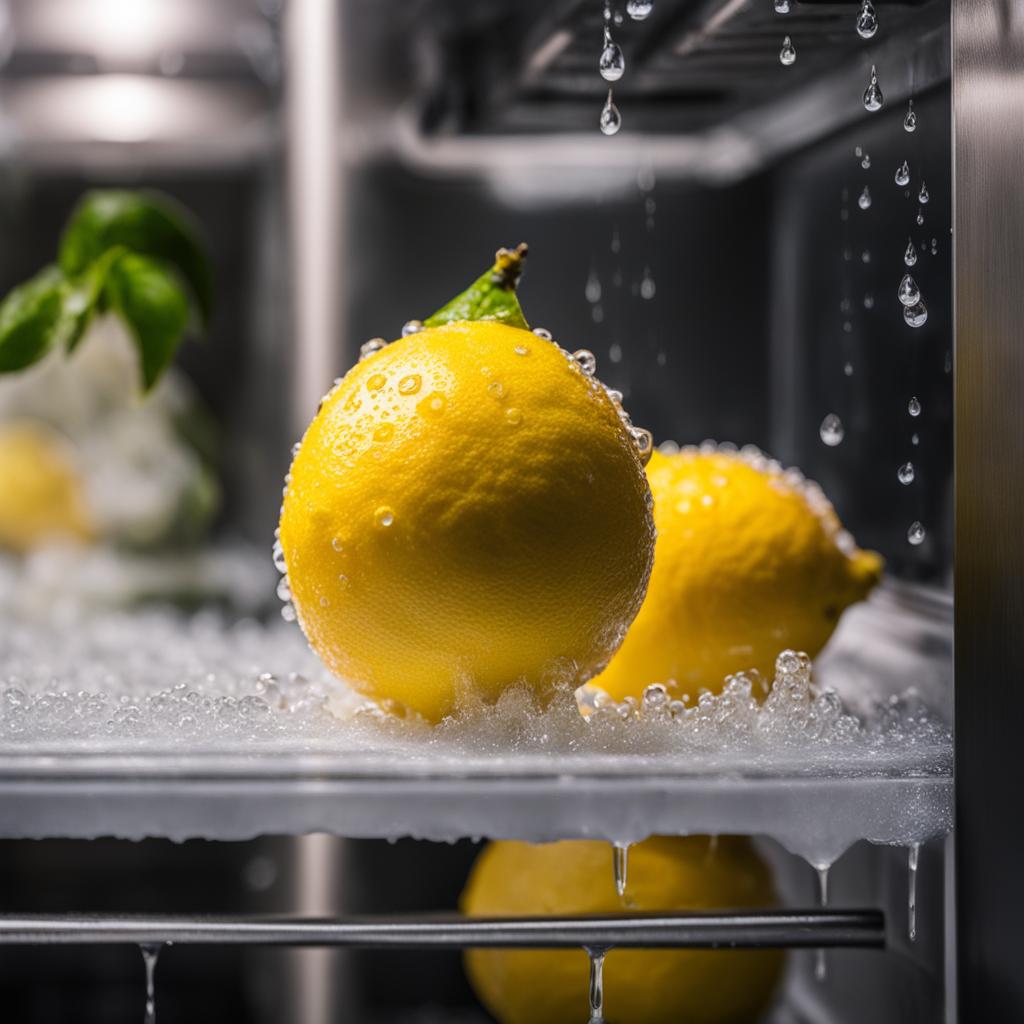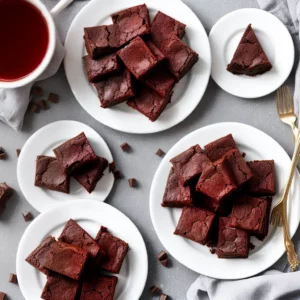Lemons are a versatile citrus fruit that adds brightness and flavor to many dishes. Learning how to store and freeze lemons can help you enjoy their juiciness and tangy taste all year round. In this comprehensive guide, we will explore different methods of freezing lemons and preserving their freshness. Whether you want to freeze whole lemons, lemon slices, or lemon juice, we’ve got you covered.
Key Takeaways:
- Freezing lemons allows you to preserve their freshness and citrus flavor.
- Properly store lemons in food-safe plastic bags or containers to prevent freezer burn.
- Different methods include freezing whole lemons, lemon slices, juice, and zest.
- Thaw frozen lemons in the refrigerator or using short bursts in the microwave.
- Experiment with different lemon preservation methods to enhance your culinary repertoire.
How to Store Lemons in the Fridge for Extended Freshness
Storing lemons in the refrigerator is a simple and effective way to extend their freshness and ensure they stay juicy and flavorful for a longer period of time. To properly store whole lemons in the fridge, follow these steps:
- Place the lemons in a food-safe plastic bag.
- Squeeze out any excess air before sealing the bag.
- Store the bag of lemons in the refrigerator, preferably in the crisper drawer.
By storing lemons in a sealed bag, you help prevent moisture loss and maintain the fruit’s juiciness. Keeping them in the crisper drawer provides a cooler and more consistent temperature, further preserving their freshness. When stored this way, whole lemons can stay fresh in the refrigerator for up to three weeks.
If you prefer to store lemon wedges or slices, use a food-safe plastic container instead of a bag. Place the lemon wedges or slices in the container and seal it tightly. Store the container in the crisper drawer of the refrigerator. This method can keep the lemon wedges or slices fresh for about three to four days.
Increase the shelf life of lemons by storing them properly in the refrigerator. By following these storage tips, you can enjoy fresh and flavorful lemons whenever you need them.
Properly storing lemons in the refrigerator helps to extend their shelf life and allows you to enjoy their bright flavor for a longer time. By following these simple steps, you can keep your lemons fresh and ready to use whenever you need them.
How to Freeze Whole Lemons for Long-Term Preservation
Freezing whole lemons is a simple and convenient way to preserve their freshness for an extended period. To begin, make sure to wash the lemons thoroughly and pat them dry. This ensures that any residual dirt or impurities are removed before freezing.
Once the lemons are clean and dry, place them in a food-safe plastic bag. Be sure to eliminate as much air as possible from the bag, as excess air can lead to freezer burn. By minimizing air exposure, you can maintain the quality and flavor of the lemons for up to four months.
When it’s time to thaw the frozen lemons, there are a couple of methods you can use. One option is to microwave the lemon for a short time, allowing it to soften before use. Alternatively, you can place the frozen lemon in room-temperature water and let it thaw naturally. Both methods work effectively, so choose the one that suits your needs and preferences.
Table: Freezing Whole Lemons vs. Other Preservation Methods
| Preservation Method | Storage Duration | Quality Retention | Convenience |
|---|---|---|---|
| Freezing Whole Lemons | Up to 4 months | Excellent | High |
| Refrigerating Whole Lemons | Up to 1 month | Good | Medium |
| Freezing Lemon Slices | Up to 4 months | Good | High |
| Freezing Lemon Juice | Up to 3 months | Good | High |
| Freezing Lemon Zest | Up to 3 months | Good | High |
“Freezing whole lemons is a great way to preserve their natural flavor and juiciness for future use. It’s a convenient method that allows you to have lemons on hand whenever you need them, even if they’re out of season.”
In summary, freezing whole lemons is an excellent preservation method that retains the flavor and quality of the fruit for an extended period. Whether you want to use the zest, juice, or the whole lemon, freezing is a simple and effective way to ensure you always have fresh citrus at your disposal. So go ahead, stock up on lemons, and freeze them for long-term enjoyment!
Freezing Lemon Slices for Added Convenience
Freezing lemon slices is a great way to have the convenience of fresh lemon juice whenever you need it. Whether you want to add a spritz of lemon to your drinks or use it as a garnish for your dishes, frozen lemon slices can be a lifesaver. Here’s a step-by-step guide on how to freeze lemon slices:
- Start by washing and drying the lemons thoroughly to remove any dirt or residue.
- Slice the lemons into 1/4-inch thick rounds. Make sure the slices are uniform in size for even freezing.
- Line a baking sheet with parchment paper and place the lemon slices in a single layer.
- Make sure the lemon slices are not touching each other to prevent them from sticking together.
- Place the baking sheet in the freezer and let the lemon slices freeze overnight or until they are solid.
- Once the lemon slices are fully frozen, transfer them to a ziplock bag or an airtight container for storage.
When using the frozen lemon slices, keep in mind that the texture may become mushy when thawed. However, they are still perfect for infusing water, cooking fish or chicken, and adding a burst of citrus flavor to your recipes. Freezing lemon slices is a convenient way to always have the tangy taste of lemons at your fingertips.
Table: Comparing Freezing Methods for Lemons
| Freezing Method | Advantages | Disadvantages |
|---|---|---|
| Freezing Whole Lemons | Preserves the entire lemon for versatile use | Texture becomes mushy when thawed |
| Freezing Lemon Slices | Convenient for adding lemon flavor to drinks and dishes | Texture may become mushy when thawed |
| Freezing Lemon Juice | Allows for precise measurements in recipes | May lose some freshness and flavor when frozen |
| Freezing Lemon Zest | Prolongs the shelf life of lemon zest | Texture may become brittle when frozen |
As you can see, each freezing method has its advantages and disadvantages. It’s important to choose the method that best suits your needs and the specific culinary applications you have in mind. Whether you prefer whole lemons, lemon slices, lemon juice, or lemon zest, freezing lemons can help you enjoy the bright and tangy taste of citrus all year round.
Freezing Lemon Juice for Convenient Measurements
When it comes to preserving lemons, freezing lemon juice is a fantastic option that provides convenience and ensures you always have fresh citrus juice on hand. Whether you need a spritz of lemon juice for cooking, baking, or making refreshing beverages, freezing lemon juice allows you to easily measure and use the desired amount without wastage.
To freeze lemon juice, start by zesting the lemons using a microplane grater or zesting tool. Collect the zest and place it in a resealable plastic bag. Next, juice the lemons and pour the juice into a small container or ice cube trays. If using ice cube trays, each cube can hold approximately one tablespoon of lemon juice.
Once you have filled the container or ice cube trays with lemon juice, cover them tightly with a lid or plastic wrap. Place them in the freezer and allow them to freeze completely, which typically takes several hours. Once frozen, transfer the lemon juice cubes to a ziplock bag for long-term storage. These frozen lemon juice cubes can last up to three months in the freezer.
How to Freeze Lemon Zest for Easy Flavor Enhancement
Freezing lemon zest is a simple and convenient way to preserve the flavorful peel of lemons and enhance the taste of your dishes. To freeze lemon zest, start by washing the lemons thoroughly to remove any dirt or residue. Then, using a microplane grater or a zesting tool, gently grate the outer layer of the lemons to obtain the zest. Place the zest in a mason jar or a ziplock bag, ensuring that it is tightly sealed to prevent freezer burn.
By freezing lemon zest, you can have this citrusy ingredient readily available whenever you need it. The frozen zest can be used directly from the freezer without thawing, making it a convenient addition to your recipes. Whether you want to add a tangy twist to your baked goods, sauces, dressings, or marinades, frozen lemon zest will infuse your dishes with a burst of fresh flavor.
To make the most of your frozen lemon zest, it’s important to label the container with the date of freezing. This way, you can keep track of its freshness and use it within the recommended storage time of four months. Incorporating frozen lemon zest into your cooking repertoire allows you to elevate the taste of your favorite recipes and enjoy the vibrant essence of lemons all year round.
| Benefits of Freezing Lemon Zest | Tips for Freezing Lemon Zest |
|---|---|
|
|
“Freezing lemon zest is a simple and convenient way to preserve the flavorful peel of lemons and enhance the taste of your dishes.”
Freezing lemon zest not only ensures the availability of this essential ingredient but also retains its vibrant flavor and aroma. Whether you need a pinch of zest to brighten up your dessert or a hint of citrusy tang in your savory dishes, frozen lemon zest is a game-changer in the kitchen. So, next time you have an abundance of lemons, don’t let them go to waste. Freeze the zest and unlock a world of fresh and zesty possibilities for your culinary creations!
Defrosting Frozen Lemons for Use in Recipes
Once you have frozen your lemons for long-term preservation, it’s important to know how to defrost them properly when you’re ready to use them in your favorite recipes. Here are some simple methods to defrost different forms of frozen lemons:
Defrosting Whole Lemons
To thaw frozen whole lemons, you have a couple of options. One method is to place them in the refrigerator overnight. This slow thawing process helps the lemons retain their shape and texture, making them suitable for garnishing or extracting juice. Another option is to use the microwave. Defrost the whole lemons in short intervals, checking their texture periodically. Just be aware that the texture of whole lemons may become mushy when thawed, so it’s best to utilize the zest and juice.
Defrosting Lemon Juice
If you have frozen lemon juice in containers or ice cube trays, you can thaw it by placing the container in the refrigerator overnight. For a quicker thaw, microwave the lemon juice cubes in short bursts until fully defrosted. The thawed lemon juice can be used in recipes that call for fresh lemon juice, adding a zesty citrus flavor to your dishes or beverages.
Using Frozen Lemon Zest
Frozen lemon zest can be used directly from the freezer without the need for thawing. Whenever your recipe calls for a burst of vibrant lemon flavor, simply reach into your freezer, grab the frozen lemon zest, and sprinkle it into your dishes. Frozen lemon zest retains its aroma and taste, enhancing the flavors of your culinary creations.
With these straightforward methods of defrosting frozen lemons, you can conveniently incorporate the vibrant citrus flavor of lemons into your cooking or baking endeavors. Whether it’s whole lemons, lemon juice, or lemon zest, the freezing and defrosting process allows you to enjoy the freshness and tanginess of lemons any time of the year.

Tips for Maximizing the Shelf Life of Lemons
Proper storage is key to maximizing the shelf life of lemons and ensuring that they stay fresh and juicy for as long as possible. Here are some tips to help you extend the lifespan of your lemons:
- Store lemons in the refrigerator: Keeping lemons in the fridge can significantly prolong their freshness. Whole lemons can last up to 21 days when refrigerated, compared to just one week at room temperature.
- Use airtight containers: When storing cut lemons or lemon slices, place them in airtight containers to prevent them from drying out. This will help maintain their juiciness and flavor for a longer period of time.
- Avoid exposure to moisture: Moisture can cause lemons to spoil quickly. Make sure to store lemons in dry conditions and avoid placing them in areas where they may come into contact with excessive moisture.
- Keep lemons away from ethylene-producing fruits: Ethylene is a natural gas that speeds up the ripening process of fruits. To prevent your lemons from ripening too quickly, store them separately from ethylene-producing fruits like apples, bananas, and tomatoes.
By following these simple storage tips, you can extend the shelf life of your lemons and enjoy their refreshing taste in various recipes for a longer period of time.
| Storage Method | Shelf Life |
|---|---|
| Refrigerator | Up to 21 days |
| Airtight Containers | 3 to 4 days |
| Avoiding Moisture | Varies |
| Separate from Ethylene-Producing Fruits | Varies |
By referencing the table above, you can see the recommended shelf life for different storage methods. Remember to conduct regular visual and smell checks to ensure the lemons are still fresh before using them in your recipes.
With these lemon storage tips in mind, you can enjoy the tangy, citrusy goodness of lemons for an extended period, making them a versatile and long-lasting ingredient in your kitchen.
Exploring Different Uses for Frozen Lemons
Frozen lemons have a multitude of culinary applications that can add a burst of refreshing citrus flavor to your dishes. Here are some creative ways to make the most of your frozen lemons:
- Lemon Zest: Grate a whole frozen lemon to extract its zest, which can be used to season savory dishes, add a tangy twist to desserts, or infuse oils and vinegars.
- Lemon-Infused Water: Drop frozen lemon slices into a glass of water for a refreshing and hydrating citrus-infused drink, perfect for quenching your thirst on a hot day.
- Lemon Garnish: Use frozen lemon slices as a vibrant garnish for cocktails, mocktails, or even as an eye-catching addition to your favorite savory dishes.
- Thawed Lemon Juice: Incorporate thawed lemon juice into your recipes that call for fresh lemon juice, such as homemade salad dressings, marinades, sauces, baked goods, or even cocktails.
With these inventive uses for frozen lemons, you can elevate the flavor profile of your dishes and enjoy the bright and zesty taste of lemons all year round.
| Uses for Frozen Lemons | Recipes |
|---|---|
| Lemon Zest | Lemon Poppy Seed Muffins |
| Lemon-Infused Water | Lemon Mint Cooler |
| Lemon Garnish | Lemon Garlic Roasted Chicken |
| Thawed Lemon Juice | Lemon Bars |
Benefits of Refrigerating Lemons for Short-Term Storage
Refrigerating lemons offers several benefits for short-term storage. By keeping lemons in the fridge, you can extend their freshness and ensure they stay juicy and tangy for a longer period. Whole lemons, when stored in the refrigerator, can last up to one month compared to just one week at room temperature. This allows you to have fresh lemons on hand whenever you need them, without worrying about them spoiling quickly.
When you store lemons in the fridge, the colder temperature helps slow down the natural aging process of the fruit. The cool environment helps preserve the lemons’ juiciness and prevents them from drying out. The refrigerator also provides a more stable and controlled climate, which helps maintain the lemons’ flavor and aroma.
“Refrigerating lemons can extend their shelf life and keep them fresh for a longer period. It’s a convenient option for short-term storage, allowing you to enjoy the vibrant taste of lemons whenever you need them.”
Another advantage of refrigerating lemons is that it gives you the flexibility to store them for a few weeks without resorting to freezing. If you only need to preserve lemons for a short period, refrigeration is a convenient and easy option. However, for long-term storage exceeding one month, freezing lemons using the methods discussed earlier is the best approach to ensure their long-lasting freshness.
| Benefits of Refrigerating Lemons |
|---|
| Extends the shelf life of lemons |
| Preserves the juiciness and flavor |
| Provides a controlled and stable environment |
| Allows for short-term storage convenience |
In conclusion, refrigerating lemons for short-term storage offers numerous benefits. It helps extend their shelf life, preserve their juiciness and flavor, and provides a controlled environment to maintain their freshness. Whether you choose to refrigerate or freeze lemons, these preservation methods ensure you can enjoy the vibrant taste of lemons whenever you want, regardless of the season.

The Best Ways to Preserve Lemons Based on Your Needs
Preserving lemons is a versatile process that offers various options depending on your specific needs. Whether you want to enjoy the tangy zest, the refreshing juice, or the vibrant flavor, there are different preservation techniques that can help. Here are some of the best ways to preserve lemons:
1. Freezing Whole Lemons
Freezing whole lemons is ideal for long-term preservation. It allows you to retain the flavor and juiciness of the fruit for up to four months. Simply wash the lemons, pat them dry, and place them in a food-safe plastic bag with minimal air trapped inside. When you’re ready to use the lemons, thaw them by microwaving for a short time or placing them in room-temperature water. It’s important to note that the texture of the thawed whole lemons may become mushy, so it’s best to use the zest and juice instead of the slices.
2. Freezing Lemon Slices, Juice, and Zest
If you prefer more convenience in using lemons, you can freeze them in different forms. Slice the lemons into 1/4-inch thick rounds and lay them on a parchment-lined baking sheet. Freeze the slices overnight and then transfer them to a ziplock bag for storage. Frozen lemon slices are perfect for infusing water, cooking fish or chicken, and using as a garnish. To freeze lemon juice, zest the lemons and pour the juice into a small container or ice cube trays. Once frozen, transfer the lemon juice cubes to a ziplock bag. Thaw the lemon juice by placing the container in the refrigerator overnight or microwaving it in short bursts. For zest preservation, wash the lemons, zest them using a grater or zesting tool, and store the zest in a mason jar or ziplock bag in the freezer. Frozen lemon zest can be used directly from the freezer without thawing.
3. Exploring Other Preservation Techniques
In addition to freezing, there are other exciting methods for preserving lemons. Fermenting lemons creates a unique tangy flavor that can enhance Middle Eastern and Mediterranean dishes. To make fermented lemons, cut the lemons into quarters without fully separating the pieces, then pack them with salt in a jar and let them ferment for several weeks. Drying lemon slices is another option, as they can be used to add a burst of citrus to teas, cocktails, or desserts. Simply slice the lemons thinly and dry them in a dehydrator or a low-temperature oven until crisp.
No matter which preservation method you choose, storing lemons properly and using food-safe containers or bags will help maintain their freshness and flavor for an extended period. Determine your specific culinary requirements and preferences to decide which preservation technique is best suited for your needs. With the versatility of preserved lemons, you can enjoy the vibrant taste of citrus in your cooking all year round.
Additional Tips and Ideas for Preserving Lemons
Preserving lemons at home offers endless possibilities. In addition to freezing, you can explore other preservation techniques such as making preserved (fermented) lemons or drying lemon slices. Fermented lemons have a unique tangy flavor and can be used in various Middle Eastern and Mediterranean dishes. Dehydrated lemon slices can add a burst of citrus to teas, cocktails, or desserts. Get creative and experiment with different lemon preservation methods to enhance your culinary repertoire and enjoy the vibrant taste of lemons all year round.
When it comes to preserving lemons, there are a few additional tips that can help you achieve the best results. Firstly, always use fresh, high-quality lemons for optimal flavor and preservation. Washing the lemons thoroughly before preserving them is essential to remove any dirt or residue. Additionally, make sure to remove all seeds and pith when using lemons in any preservation method to avoid any bitterness.
For fermented lemons, start by quartering the lemons without fully cutting through the bottom, then pack them with salt and place them in a jar. Let the lemons sit at room temperature, occasionally giving them a gentle shake to release the juices. After a few weeks, they will be ready to use. When it comes to dehydrating lemon slices, evenly slice the lemons and place them on a baking sheet lined with parchment paper. Bake them at a low temperature until they are completely dried out. Store the dehydrated lemon slices in an airtight container to maintain their crispness.
| Preservation Method | Benefits |
|---|---|
| Freezing | – Preserves the freshness and flavor – Convenient for future use – Suitable for whole lemons, slices, juice, and zest |
| Fermenting | – Creates a unique tangy flavor – Enhances Middle Eastern and Mediterranean dishes – Adds complexity to various recipes |
| Dehydrating | – Intensifies the lemon flavor – Provides a crispy texture and visual appeal – Versatile for use in teas, cocktails, and desserts |
Whether you choose to freeze, ferment, or dehydrate lemons, these preservation methods allow you to elevate your culinary creations and savor the bright, citrusy taste of lemons all year long. So why not roll up your sleeves, grab some lemons, and embark on a journey of preserving these zesty delights in exciting and delicious ways?
Conclusion
In conclusion, freezing lemons is a simple and practical method for preserving their freshness and citrus flavor. Whether you choose to freeze whole lemons, lemon slices, juice, or zest, these techniques allow you to enjoy the vibrant taste of lemons even when they are out of season. By following the proper storage guidelines, such as using food-safe containers and removing excess air, you can prevent freezer burn and maintain the quality of the frozen lemons.
Freezing lemons not only extends their shelf life but also provides convenience in the kitchen. You can easily incorporate frozen lemons into your recipes by thawing whole lemons, slices, or juice as needed. The frozen zest can be used directly without thawing, adding a burst of citrus flavor to your favorite dishes and drinks.
By learning how to freeze lemons, you can harness the versatility of this citrus fruit and elevate your culinary creations. Whether you are infusing water, cooking savory dishes, baking desserts, or adding zest to your meals, frozen lemons offer a transformative zest that can enhance the flavors and elevate your cooking. So next time you have an abundance of lemons, don’t let them go to waste; freeze them and enjoy the freshness all year round!
FAQ
How long can whole lemons be stored in the refrigerator?
Whole lemons can be stored in the refrigerator for up to three weeks.
How long can cut lemons be stored in the refrigerator?
Cut lemons can be stored in the refrigerator for three to four days.
How long can whole lemons be frozen?
Whole lemons can be frozen for up to four months.
How should I thaw frozen whole lemons?
To thaw whole lemons, you can place them in the refrigerator overnight or use the microwave in short intervals.
How should I freeze lemon slices?
To freeze lemon slices, wash and dry the lemons, slice them into 1/4-inch thick rounds, freeze overnight on a parchment-lined baking sheet, and then transfer them to a ziplock bag for storage.
How long can frozen lemon juice be stored?
Frozen lemon juice can be stored for up to three months.
How should I thaw frozen lemon juice?
To thaw frozen lemon juice, you can place the container in the refrigerator overnight or microwave the ice cubes.
Can I use frozen lemon zest directly from the freezer?
Yes, you can use frozen lemon zest directly from the freezer without thawing.
How can I maximize the shelf life of lemons?
To maximize the shelf life of lemons, store them in food-safe plastic bags or containers, remove excess air, and refrigerate whole lemons for up to three weeks or cut lemons for three to four days.
What are some uses for frozen lemons?
Frozen lemons can be used for grating zest, infusing water, cooking fish or chicken, making sauces, and adding a burst of citrus flavor to drinks or desserts.
How long can lemons be stored in the refrigerator compared to room temperature?
Whole lemons can last up to one month in the refrigerator, compared to one week at room temperature.
What is the best method to preserve lemons?
The best method to preserve lemons depends on your specific needs. Refrigeration is ideal for short-term storage, while freezing whole lemons is suitable for long-term storage.
Are there other ways to preserve lemons?
Yes, in addition to freezing, you can explore other preservation techniques such as making preserved (fermented) lemons or drying lemon slices.
How can I use frozen lemons in recipes?
Frozen lemons can be used to provide zest for seasoning or adding to dishes, infusing water, cooking, baking, and adding lemon juice to recipes that call for fresh lemon juice.
Can frozen lemons be used after thawing?
Yes, frozen lemons can be used after thawing, but it’s important to note that the texture of whole frozen lemons may become mushy when thawed, so it’s best to utilize the zest and juice.
Source Links
- https://www.glad.com/food-protection/protection-pointers/how-to-store-and-freeze-lemons-to-last/
- https://www.schneiderpeeps.com/all-about-lemons-freezing/
- https://www.acouplecooks.com/can-you-freeze-lemons/
Related Recipes:
 All About Lemon Zest: How to Use It
All About Lemon Zest: How to Use It
 How to Store Lemons for Maximum Freshness
How to Store Lemons for Maximum Freshness
 Lime Zest Substitutes for Your Cooking Needs
Lime Zest Substitutes for Your Cooking Needs
 How to Freeze Oranges: Keep Citrus Fresh for Longer
How to Freeze Oranges: Keep Citrus Fresh for Longer
 Lemon Zest Substitute: Best Alternatives
Lemon Zest Substitute: Best Alternatives
 How to Store Citrus Fruits for Best Flavor
How to Store Citrus Fruits for Best Flavor
 How to Freeze Oranges: Keep Citrus Fresh for Longer
How to Freeze Oranges: Keep Citrus Fresh for Longer
 How to Freeze Bananas? (Perfect Step-By-Step Guide)
How to Freeze Bananas? (Perfect Step-By-Step Guide)








